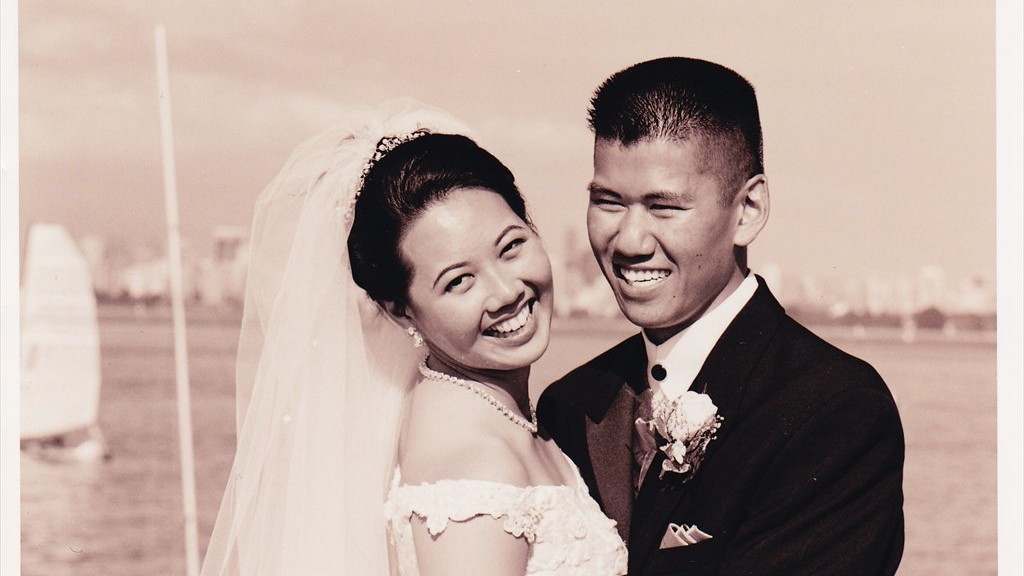Advice for the New Groom (Or Bride) from a Seasoned Husband

Advice for the New Groom (Or Bride) from a Seasoned Husband
On Tuesday, Josh posted a blog called 5 Reasons Why My Wife is Amazing. It was a great look at his relationship with his lovely wife Lisa.
On Wednesday, Ben wrote Marriage: The Opposite of Boring and shared some of amazing experiences with wife Megan during their first six months of marriage.
As the other male contributor to this site, I didn’t want to feel left out. And as the elder statesman here (both in age and in marriage length), I feel that I could teach readers a thing or two. Or three.
I’ve been blessed to be married to my lovely wife Gail for 15 years now. We met back in 1989 and she was the one who introduced me to Jesus Christ and his Church (I received the Sacraments of Initiation at Easter 1993).
I imagine channeling my inner-Marty McFly and traveling back to July 8, 2000. If I saw my much skinnier, good-looking, flat-topped self back then, there are 3 points of advice I would give myself; things that I’ve learned through 15 years of marriage.
1. Compliment your spouse
I believe that in general, we don’t do a good enough job of affirming people. I’m talking about in our own families, among friends, in our workplaces, and in ministry. Often, it’s easier to find faults in others and judge others than it is to say something nice about them. That’s why I’ve been doing my #dailyaffirmation initiative on Facebook.
At home, I do my best to affirm Gail and our kids as much as I can, especially on nights where my time with them is limited. There’s no such thing as too many compliments (as long as they are sincere).
It’s amazing how a simple compliment like “You look great today” or “That dinner you cooked was delicious” can go such a long way in making someone feel good. While Gail would never say those two particular things to me (haha) she certainly affirms other skills and characteristic of mine.
2. Complement your spouse
Gail and I are different in many ways. For example, she’s tidy. She’s fashionable. She’s organized. She’s humble. She has discretion. She’s handy around the house. She’s a good cook. Boy, those were a lot of examples!
It’s not so much about making up for each other’s deficiencies, rather it’s about working together to fill in the gaps. Whereas Gail will cook the meals, I do the cleaning up afterwards. While she’s doing the laundry, I’m vacuuming and cleaning the bathrooms. She disciplines the kids while I play with them (haha). While we’re not perfect at everything, we certainly cover more ground together than we would on our own.
It comes down to being honest about what you’re good – and not good – at. I’m 41 years-old, and I would much rather utilize my strengths and gifts than worrying about what I’m not good at.
Now that doesn’t mean that we should stop learning new skills or trying new things. But it does mean making smart decisions to make the best use of our time and talent. I’m the stronger communicator, Gail is the better organizer. She is the better cook (by far) and I get all the hard math problems with the kids. Things seem to work out. Mostly.
3. Forgive your spouse (and ask for forgiveness)
Gail and I have had many disagreements over the years. Some have been major while others have been minor. We’re getting better (finally) about apologizing and asking for forgiveness.
I don’t mean the kind of sorry you say just so you can move on or because you think your spouse is being too proud and will never say it (we’ve had those ones too). Apologies should be timely, genuine, and relevant. As Pope Francis said last year, married couples should not go to bed angry…even if the plates fly.
A large part of forgiveness is humility. It is required to move forward and grow as a couple. It could be a humble recognition that you’re not good at something or that your spouse can do something better than you. It could mean dying to your own desires. Humility teaches us empathy, compassion, and selflessness.
There are many other things I could have written about, including communicating with spouse, sacrificing for your spouse, loving your spouse, and praying with and for your spouse. These are all things that Gail and I hold true and dear to our hearts. Some of these things I’ve learned directly from Gail, other things more indirectly. She may have even learned a thing or two from me. And we’ve learned many of these things together as a couple.
One thing’s for certain: we will never stop learning and growing.
Join the Converstation
We encourage and appreciate your comments and discussion on this site. Please remember to be charitable in disagreement. We reserve the right to remove comments that are deemed hurtful or excessively vulgar.





